
Obesity is a growing health concern worldwide, with many people struggling to lose weight through traditional methods like diet and exercise. For individuals facing severe obesity, bariatric surgery has long been considered the most effective solution. However, not everyone is a candidate for surgery, and some may seek alternatives that are less invasive yet still offer substantial weight loss results. This is where endo bariatric procedures come in – a cutting-edge, non-surgical approach to weight loss that can deliver impressive results with minimal downtime.
What are Endo Bariatric Procedures?
Endo bariatric procedures are a group of minimally invasive treatments designed to help patients lose weight by altering the digestive system. Unlike traditional bariatric surgery, which involves making incisions to physically alter the stomach or intestines, endo bariatric procedures are performed using a flexible endoscope – a thin tube with a camera that is inserted through the mouth or other small openings.
These procedures offer a number of benefits, including shorter recovery times, fewer risks, and no need for large incisions. Some of the most common endo bariatric procedures include:
- Intragastric Balloon: This procedure involves placing a balloon inside the stomach, which is inflated to take up space. This helps patients feel fuller more quickly, reducing their overall food intake and promoting weight loss.
- Endoscopic Sleeve Gastroplasty (ESG): In this procedure, the stomach is reshaped using sutures to reduce its size. This limits the amount of food the stomach can hold, helping patients feel satisfied with smaller portions.
- Gastric Botox: In this procedure, botulinum toxin is injected into the stomach to relax the muscles, which slows down digestion and increases feelings of fullness.

How Do Endo Bariatric Procedures Work?
Endo bariatric procedures work by altering the stomach’s capacity or how it processes food, helping patients feel full after consuming smaller amounts. For example, the intragastric balloon takes up space in the stomach, so patients eat less and feel fuller sooner. Similarly, the endoscopic sleeve gastroplasty shrinks the stomach size, making it more difficult to overeat.
These procedures are performed under general anesthesia or sedation, and because no incisions are made, the recovery time is significantly shorter compared to traditional surgery. Most patients can return to their normal activities within a few days.

Benefits of Endo Bariatric Procedures
- Minimally Invasive: No large incisions are required, reducing the risk of complications and infection.
- Faster Recovery: With less trauma to the body, recovery time is much quicker than with traditional weight loss surgery.
- Effective Weight Loss: Patients typically lose 30-50% of their excess weight within 6-12 months, depending on the procedure.
- Reversible Options: Some procedures, such as the intragastric balloon, are temporary and can be removed after the desired weight loss has been achieved.
Who is a Candidate for Endo Bariatric Procedures?
Endo bariatric procedures are ideal for individuals with a BMI (Body Mass Index) of 30-40 who have struggled with obesity and have not been successful with diet and exercise alone. They are also a great option for those who are not candidates for traditional bariatric surgery due to health concerns or personal preferences.
However, not everyone is a suitable candidate. A thorough evaluation with a bariatric specialist is required to determine which procedure is most appropriate based on the individual’s health, medical history, and weight loss goals.
- Leading Endoscopy Hospital in Ahmedabad/Gujarat – Expert Gastroenterology Care - February 14, 2026
- Advanced GI Laparoscopic Surgery in Ahmedabad/Gujarat – Minimally Invasive Treatment - February 7, 2026
- ERCP Treatment in Ahmedabad/Gujarat – Expert Biliary & Pancreatic Care - January 31, 2026

